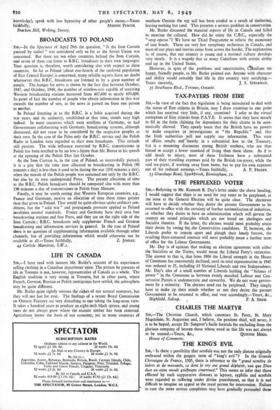BROADCASTS TO POLAND
SIR,—In the Spectator of April 29th the question, " Is the Iron Curtain pierced by radio? " was considered only so far as the Soviet Union was 'concerned. But there are ten other countries behind the Iron Curtain, and seven of them can listen to B.B.C. broadcasts in their own languages. Your question is, therefore, worth considering also with respect to these countries. So far as Poland (about one-fourth of the enslaved population of East Central Europe) is concerned, many, reliable reports leave no doubt whatsoever that B.B.C. broadcasts are listened to by a great number of • peeple. The hunger for news is shown by the fact that between October, 1947, and October, 1948, the number of wireless-sets capable of receiving Western broadcasting stations increased from 467,000 to nearly 635,000. In point of fact the number of people who obtain information in this way - exceeds the number of sets, as the news, is passed on from one person
to another. • In Poland listening in to the B.B.C. is a habit acquired during the war years, and its authority, established ..at that time; stands very high indeed. In most countries which were satellites of Germany, or had Governments collaborating with Germany, broadcasting systems, although distrusted, did not cease to be considered by the respective peoples as their own. In the case of the Poles only the B.B.C. service and the Polish Radio in London were regarded as their own broadcasts. This attitude still persists. The wide influence exercised by B.B.C. transmissions in Polish has been testified to by no less a figure than Mr. Bierut in his speech at the opening of the Polish Diet last October.
As the Iron Curtain is, in the case of Poland, so successfully pierced, it is a pity that the time now allocated to broadcasting in Polish (90 minutes a day) is less than it used to be during the war (150 minutes a..day), When the morale of the Polish people was, sustained not only by the B.B.C. but also by its own underground Press. The present allocation of time
. to the B.B.C. Polish broadcasts should be compared also with more than 150 minutes a day of transmissions in Polish from Moscow.
Finally, it may be worth noting that Western European countries, e,g., France and Germany, receive an allocation of time three tithes greater than that given to Poland. That would be quite obvious under ordinary con- ditions, but the " cold war " and propaganda pressure applied to Poland invalidate normal standards. France and Germany have their own free broadcasting stations and free Press, and they are on the right side of the Iron Curtain ; B.B.C. broadcasts only supplement French and German broadcasting and information services in general. In the case of Poland there is no question of supplementing information available through other channels, but of providing information which would otherwise not be






































 Previous page
Previous page